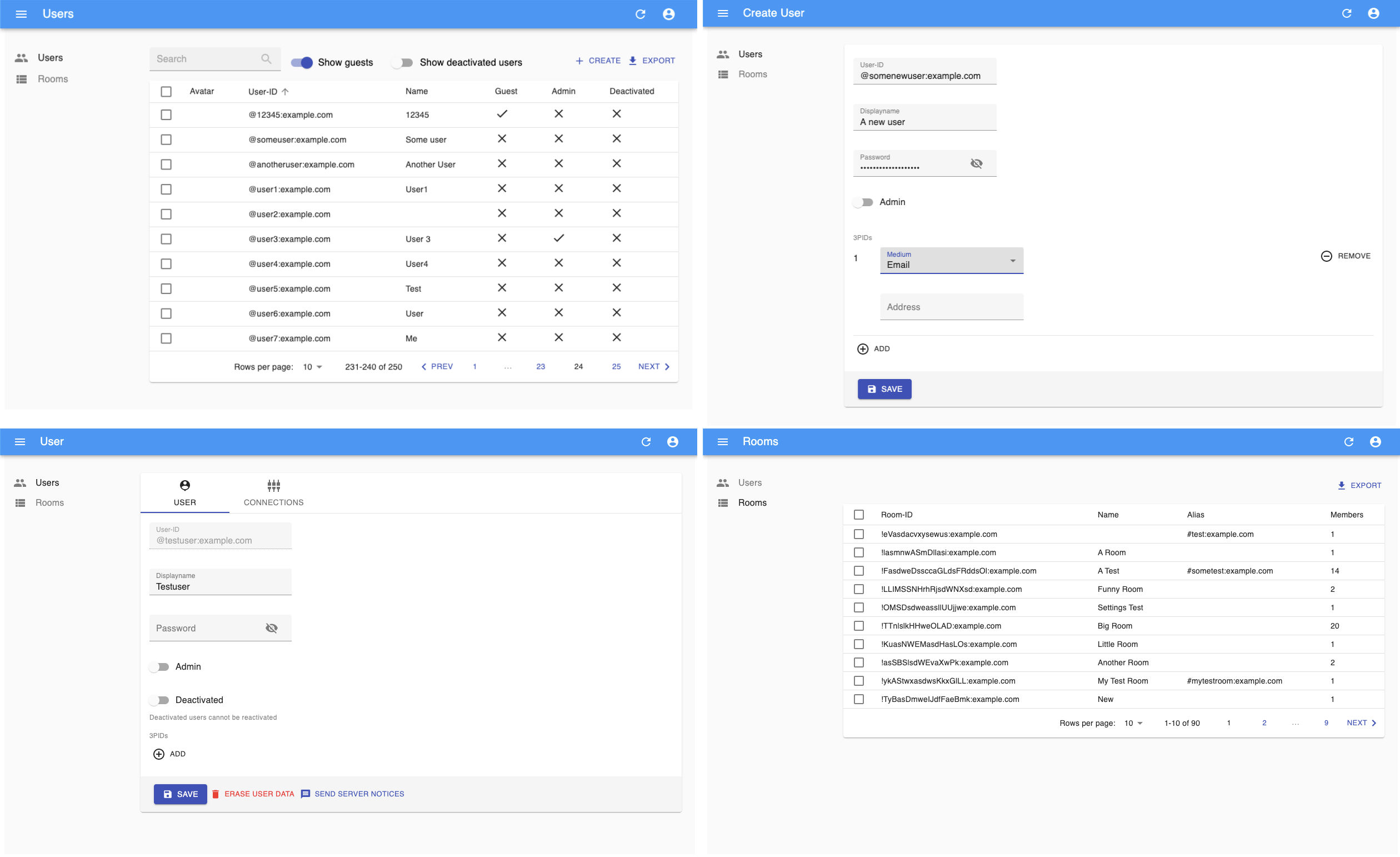Add UI option to block deleted rooms from being rejoined This is almost a copy of https://github.com/Awesome-Technologies/synapse-admin/pull/166 PR, authored by @jkanefendt |
||
|---|---|---|
| .github | ||
| .vscode | ||
| .yarn | ||
| public | ||
| src | ||
| .editorconfig | ||
| .gitattributes | ||
| .gitignore | ||
| .prettierignore | ||
| .yarnrc.yml | ||
| docker-compose.yml | ||
| Dockerfile | ||
| index.html | ||
| jest.config.ts | ||
| justfile | ||
| LICENSE | ||
| package.json | ||
| README.md | ||
| screenshots.jpg | ||
| tsconfig.eslint.json | ||
| tsconfig.json | ||
| tsconfig.vite.json | ||
| vite.config.ts | ||
| yarn.lock | ||
Synapse admin ui
This project is built using react-admin.
Fork differences
Available via CDN
On admin.etke.cc you can find the latest version of this fork.
Changes
With Awesome-Technologies/synapse-admin as the upstream, this fork is intended to be a more feature-rich version of the original project. The main goal is to provide a more user-friendly interface for managing Synapse homeservers.
The following changes are already implemented:
- Prevent admins from deleting themselves
- Fix user's default tab not being shown
- Add identifier when authorizing with password
- Add ability to toggle whether to show locked users
- Fix user's display name in header on user's page
- Fix footer overlapping content
- Switch from nginx to SWS for serving the app, reducing the size of the Docker image
- Fix redirect URL after user creation
- Display actual Synapse errors
- Fix base_url being undefined on unsuccessful login
- Put the version into manifest.json (CI only)
- Federation page improvements (using theme colors)
- Add UI option to block deleted rooms from being rejoined
the list will be updated as new changes are added
Usage
Supported Synapse
It needs at least Synapse v1.93.0 for all functions to work as expected!
You get your server version with the request /_synapse/admin/v1/server_version.
See also Synapse version API.
After entering the URL on the login page of synapse-admin the server version appears below the input field.
Prerequisites
You need access to the following endpoints:
/_matrix/_synapse/admin
See also Synapse administration endpoints
Use without install
You can use the current version of Synapse Admin without own installation direct via GitHub Pages.
Note:
If you want to use the deployment, you have to make sure that the admin endpoints (/_synapse/admin) are accessible for your browser.
Remember: You have no need to expose these endpoints to the internet but to your network.
If you want your own deployment, follow the Step-By-Step Install Guide below.
Step-By-Step install
You have three options:
- Download the tarball and serve with any webserver
- Download the source code from github and run using nodejs
- Run the Docker container
Steps for 1)
- make sure you have a webserver installed that can serve static files (any webserver like nginx or apache will do)
- configure a vhost for synapse admin on your webserver
- download the .tar.gz from the latest release: https://github.com/Awesome-Technologies/synapse-admin/releases/latest
- unpack the .tar.gz
- move or symlink the
synapse-admin-x.x.xinto your vhosts root dir - open the url of the vhost in your browser
Steps for 2)
- make sure you have installed the following: git, yarn, nodejs
- download the source code:
git clone https://github.com/Awesome-Technologies/synapse-admin.git - change into downloaded directory:
cd synapse-admin - download dependencies:
yarn install - start web server:
yarn start
Steps for 3)
-
run the Docker container from the public docker registry:
docker run -p 8080:80 awesometechnologies/synapse-adminor use the docker-compose.yml:docker-compose up -dnote: if you're building on an architecture other than amd64 (for example a raspberry pi), make sure to define a maximum ram for node. otherwise the build will fail.
services: synapse-admin: container_name: synapse-admin hostname: synapse-admin build: context: https://github.com/Awesome-Technologies/synapse-admin.git args: - BUILDKIT_CONTEXT_KEEP_GIT_DIR=1 # - NODE_OPTIONS="--max_old_space_size=1024" # - BASE_PATH="/synapse-admin" ports: - "8080:80" restart: unless-stopped -
browse to http://localhost:8080
Restricting available homeserver
You can restrict the homeserver(s), so that the user can no longer define it himself.
Edit config.json to restrict either to a single homeserver:
{
"restrictBaseUrl": "https://your-matrixs-erver.example.com"
}
or to a list of homeservers:
{
"restrictBaseUrl": ["https://your-first-matrix-server.example.com", "https://your-second-matrix-server.example.com"]
}
The config.json can be injected into a Docker container using a bind mount.
services:
synapse-admin:
...
volumes:
./config.json:/app/config.json:ro
...
Serving Synapse-Admin on a different path
The path prefix where synapse-admin is served can only be changed during the build step.
If you downloaded the source code, use yarn build --base=/my-prefix to set a path prefix.
If you want to build your own Docker container, use the BASE_PATH argument.
We do not support directly changing the path where Synapse-Admin is served in the pre-built Docker container. Instead please use a reverse proxy if you need to move Synapse-Admin to a different base path. If you want to serve multiple applications with different paths on the same domain, you need a reverse proxy anyway.
Example for Traefik:
docker-compose.yml
services:
traefik:
image: traefik:mimolette
restart: unless-stopped
ports:
- 80:80
- 443:443
volumes:
- /var/run/docker.sock:/var/run/docker.sock:ro
synapse-admin:
image: awesometechnologies/synapse-admin:latest
restart: unless-stopped
labels:
- "traefik.enable=true"
- "traefik.http.routers.synapse-admin.rule=Host(`example.com`)&&PathPrefix(`/admin`)"
- "traefik.http.routers.synapse-admin.middlewares=admin,admin_path"
- "traefik.http.middlewares.admin.redirectregex.regex=^(.*)/admin/?"
- "traefik.http.middlewares.admin.redirectregex.replacement=$${1}/admin/"
- "traefik.http.middlewares.admin_path.stripprefix.prefixes=/admin"
Screenshots
Development
- See https://yarnpkg.com/getting-started/editor-sdks how to setup your IDE
- Use
yarn lintto run all style and linter checks - Use
yarn testto run all unit tests - Use
yarn fixto fix the coding style

